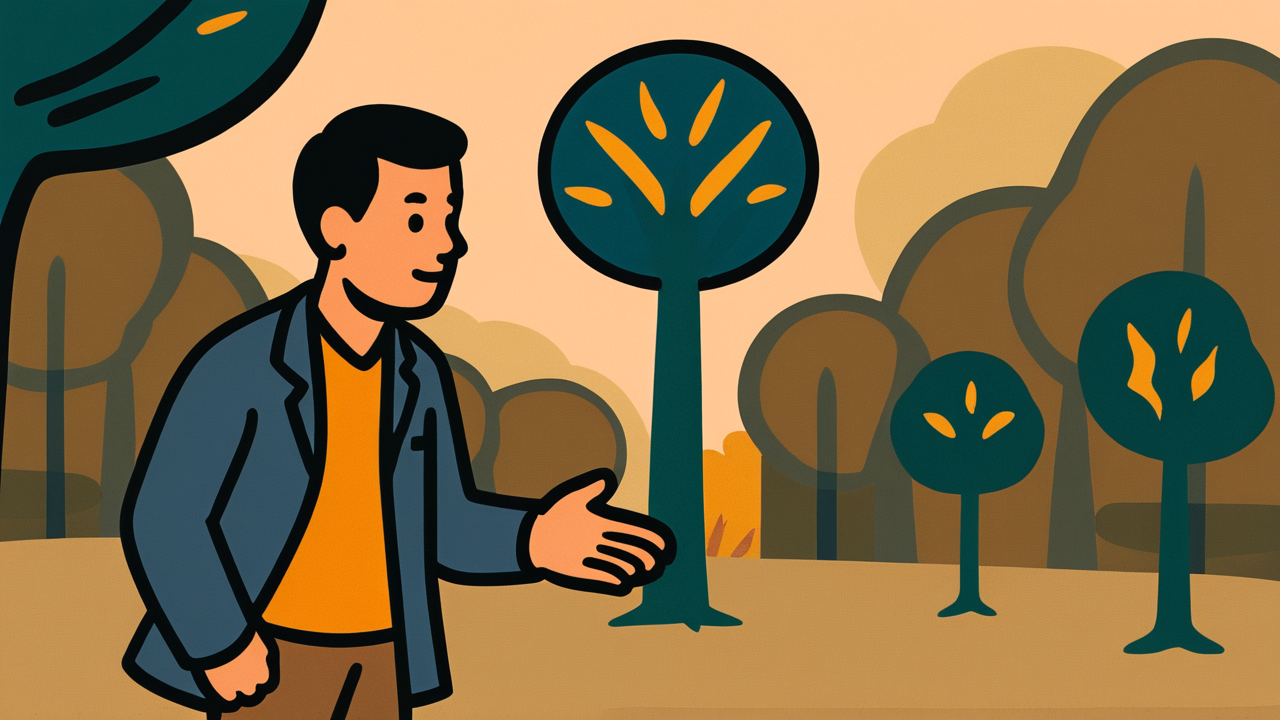How to Read “寄らば大樹の陰”
Yora ba taiju no kage
Meaning of “寄らば大樹の陰”
“If approaching, large tree’s shade” means that if you’re going to rely on someone, it’s safer and more advantageous to align yourself with powerful people or organizations.
Just as the shade of a large tree provides coolness and comfort to many people, this teaching expresses that by receiving protection from those with power and wealth, you too can live safely. This metaphor arose from the understanding that under a small tree, you cannot get sufficient shade, and it cannot be relied upon during wind and rain, but a large tree can be expected to provide reliable protection.
This proverb teaches the importance of seeking more reliable and stable backing as a realistic choice in life. It is used as a guideline suggesting that when faced with important life decisions such as changing jobs, marriage, or business partnerships, you should choose more stable options. It is by no means recommending servility, but rather teaching the importance of exercising wise judgment to choose the most advantageous and safe environment for yourself.
Origin and Etymology
The origin of “If approaching, large tree’s shade” is thought to trace back to Chinese classics. This expression is believed to have originated from the concept of “taking coolness under a large tree” found in ancient Chinese historical records and literature.
In Japan, similar expressions began appearing around the Heian period, and it is presumed that the current form became established from the Kamakura period onward. “Large tree” literally means a big tree, but it has been used as a symbol of rulers and influential people since ancient times. This is because large trees provide shade to many people and protect them from wind and rain, which was overlapped with the image of powerful figures sheltering many people.
The “yoru” in “yora ba” means to rely on or seek shelter with someone, expressing not just physical approach but also spiritual dependence. It frequently appeared in Edo period literature and was widely used as an expression reflecting the social structure of the time, such as master-servant relationships in samurai society and merchant guilds. The background to this proverb’s long-standing popularity is thought to lie in Japan’s collectivist culture and the realistic life strategy of securing safety by aligning oneself with the strong.
Usage Examples
- When finding employment, “if approaching, large tree’s shade” – major corporations are probably safer after all
- When choosing a marriage partner, they say “if approaching, large tree’s shade,” so someone with a stable profession might be better
Modern Interpretation
In modern society, “If approaching, large tree’s shade” has come to hold complex meanings. In an era where the traditional lifetime employment system has collapsed and even major corporations face bankruptcy and large-scale layoffs, the very definition of a “large tree” has become ambiguous.
In the IT industry, it’s not uncommon for startup companies established just a few years ago to experience rapid growth and surpass established companies. In such situations, values that prioritize growth potential and future prospects over company size and history have emerged. Additionally, more people are becoming independent as freelancers or entrepreneurs, with many aiming to “become a large tree themselves” rather than “leaning on a large tree.”
On the other hand, amid increasing economic instability, the “stability-oriented” desire for employment in government positions or major corporations remains strong. Particularly among younger generations, there is a strengthening tendency to avoid risks and choose certain paths, and the teachings of this proverb continue to function as realistic guidance.
In modern times, the concept of “large tree” has also diversified, with not only traditional power holders but also influential influencers, successful entrepreneurs, and even strong communities being recognized as “large trees worth approaching.”
When AI Hears This
Today’s “great trees” have actually become like time bombs. This is because the larger and more stable an organization is, the less it can adapt to change, increasing the risk of sudden collapse.
For example, major banks, department stores, and newspapers that were once considered absolutely safe are now facing difficulties one after another. These “great trees” cannot move in the face of the storm of digitalization. The larger an organization becomes, the more time it takes to change direction, and the harder it becomes to alter existing methods. It’s like how giant dinosaurs couldn’t keep up with environmental changes and went extinct.
On the other hand, small startup companies and individual business owners have a higher probability of survival. Like “small seedlings,” they can quickly adapt to environmental changes. In other words, “flexibility” is the greatest weapon in the modern era.
What’s interesting is that even massive IT companies like GAFA survive by constantly destroying themselves. While they are “great trees,” they continue to nurture countless “seedlings” internally.
True safety in the modern world doesn’t come from depending on one large protector, but from acquiring the ability to keep changing. The very concept of “the shade of a great tree” has become a dangerous way of thinking.
Lessons for Today
“If approaching, large tree’s shade” teaches modern people the importance of making wise choices. This is by no means promoting dependency, but rather wisdom for choosing the most efficient and safe path within our limited lives.
In modern society, succeeding through individual strength alone is extremely difficult. It’s important to cultivate the ability to discern “large trees” that will help you grow – environments where talented people gather, comprehensive training systems, stable management foundations. This includes not only companies but also mentors, communities, and learning environments.
What’s important is not merely seeking protection, but maintaining an attitude of providing value in that environment and growing together. Modern “large trees” are not entities that protect you unilaterally, but exist within relationships that provide mutual benefits.
This proverb teaches the importance of making life choices with humility and realistic judgment. Rather than choosing reckless paths based on pride alone, sometimes humbly borrowing the power of superior environments can ultimately yield greater results.



Comments